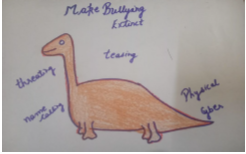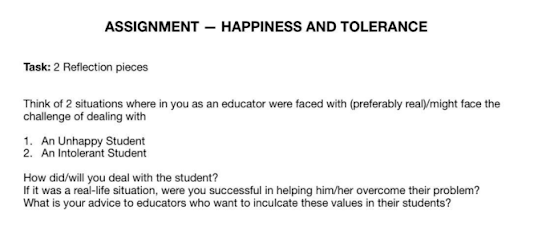Great teachers know what conditions are required for the growth of their students and provide them efficiently.
SITUATION 1 – AN UNHAPPY STUDENT
Q1. HAVE WE DEALT WITH AN UNHAPPY STUDENT?
A1.YES
Q2. HOW WILL YOU DEAL WITH THE SITUATION?
A2. We as teachers face multiple challenges daily, but what we feel is the most difficult and unfortunate challenge is having unhappy students in our class. Firstly, we as teachers should be able to make out the unhappy students in the class and then try to find the reason behind the situation because we can reach the solution to the problem only by knowing the root cause of the problem. There might be multiple reasons behind this, just to mention a few:-
- The student might be new to the school.
- The student might be new to the class due to a change in the section.
- The student might be an introvert and needs help mixing up with the rest of the class.
- The student needs to be more active and able to cope with the syllabus.
- There might be some family problem which makes him distracted, tense and, in turn, unhappy.
- There might be some health-related issue which leads to a lack of concentration, and the child becomes dissatisfied and unhappy.
- The child is unhappy with the teacher’s behaviour and attitude, or let us take it the other way. The teacher is unhappy - they will then make unhappy students, and the class atmosphere will be whole negativity.
- Some other student of the school is troubling the child.
After knowing the exact reason for the unhappiness, the situation can be dealt with accordingly.
Q3. If it was a real-life situation, were you successful in helping him/her overcome his/her problem?
A3. We as teachers have encountered many such situations but let us proceed with one specific case to answer this question. There was a student of Class VII who remained absent frequently, and when asked about his reason for absence in the Parent Teacher Meeting, his mother informed the teacher that most of the time, he was unwilling to come to school, and she asked us to inquire about the same. On asking about his behaviour and overall routine at home, we concluded that the child was an introvert and most of the time preferred to stay alone, and due to this reason, he did not have any friends in the class. Since he remained absent most of the time, his work on all the subjects needed to be completed. When work was not submitted for correction on time, the teachers used to ask the reason and time, and again he used to get reminders to complete his work.
His mother told us that he feels terrible when any teacher reminds him or gets angry with him, which would be a natural reaction of any teacher. After all, it is the duty and job of a teacher to keep a check on students’ work routines. We can clearly see his Introvert behaviour led to multiple reasons for his unhappiness. The first step was to make him comfortable in the class and bring him out of his introverted zone. We could do this successfully with the support of his classmates as well. We asked everyone in the class to give him company, keep him involved and not leave him alone. He was involved in class discussions to make him feel more confident and happy.
We, as teachers, gave him that assurance that you are capable and can do it by asking him the simplest of questions, which he could answer. No doubt the questions were simple but the amount of confidence they instilled in him was tremendous. He started liking the class and, in turn, his studies and eventually became regular at school. It was not a one or two-day process. It took time but gave us positive results.
Q4. What is your advice to educators who want to inculcate these values in their students?
A4. The famous proverb is, “You can’t make an omelette without breaking a few eggs”. That means it is impossible to do something good or accomplish an important task without encountering problems or making sacrifices. Being a teacher is not an easy task, and each day brings new challenges to be dealt with one at a time, patiently and calmly. Not every teacher needs to encounter similar problems. They might vary accordingly because no two individuals in this world are alike. Having said that, I don’t mean you will encounter zillions of problems. Issues are more or less common, and it is your way to deal with them by following some common set of rules.
We are teachers and clearly do not have a magic wand which can lead to a significant transformation in a jiffy! Keep working on the problem consistently, and you will surely get positive results. Lastly, to make the class happy, you must be satisfied because if you are unhappy, that will make the course painful.
SITUATION 2 – AN INTOLERANT CHILD
Q1. HAVE WE DEALT WITH AN UNHAPPY STUDENT?
A1. Yes, many times.
Q2. HOW WILL YOU DEAL WITH THE SITUATION?
A2. When dealing with an intolerant child, PATIENCE IS THE KEY. We have to patiently try to figure out the following two conditions:-
Condition 1 - Whether a particular student is showing such behaviour only under certain specific situations or people.
OR
Condition 2 - Whether his attitude is intolerant every time and with everybody.
How will we deal with Condition 1?
We will avoid such situations, people who make him restless and intolerant for the time being. We can only do that for a while. Once the student calms down and understands his/her behaviour, he/she will adapt to that situation/person. First, you have to calm him/her down. Then only he/she can understand and implement your instructions. This condition can be dealt with comparatively efficiently and in less time than Condition 2.
How will we deal with Condition 2?
If a child’s behaviour is intolerant every time and with everyone, then this is problematic, but of course, NOTHING IS IMPOSSIBLE. It requires a lot of input from the teacher in the form of time, energy and brain work. We need to understand the complete personality traits of that particular student to deal with him. We can explain better by taking an example – A patient visits the Doctor, and the Doctor asks about the problems and prescribes the required medicines. What if the patient is not ready to consider himself/herself a patient? The Doctor then has to deal with the situation entirely differently without making the patient feel like a patient. Similarly, if a student is intolerant, we must first make him feel normal without continuously highlighting the problem, which will worsen his attitude.
Q3. If it was a real-life situation, were you successful in helping him/her overcome his/her problem?
A3. Yes, we have encountered this problem in real life, and we were successful in minimising the problem. We will be dishonest if we say we completely eradicated the problem. Such problems need time, and they improve as the individual becomes more mature and capable of distinguishing between right/wrong and benefit/loss.
Q4. What is your advice to educators who want to inculcate these values in their students?
A4. Our advice to educators in situations like this will be to maintain patience and keep working on the problem. It is not easy to handle an intolerant student because you are not only taking care of the intolerant student, but you have to take care of the students/people towards whom that student is intolerant, as, at the end of the day, a teacher is responsible for the entire class.
Let us put it like this for dealing with an intolerant student, you have to be tolerant towards many things.
According to Helen Keller, ”The highest result of education is tolerance”.
With due credit to the author of the above lines, we as educators should add and read this quote like this:-
“The highest result of education is tolerance and the highest result of tolerance is quality education”.
Prakriti (Nature) @ RPK School Moradabad
Dhiraj Gupta, Naina Soni, Rekha Kapoor, Suman Singh, Sandeep Negi, Naushaba Sami and Isha Sharma.

























